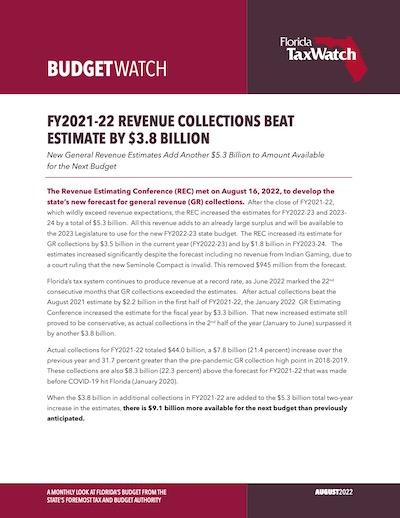FY2021-22 Revenue Collections Beat Estimate by $3.8 Billion
New General Revenue Estimates Add Another $5.3 Billion to Amount Available for the Next Budget
 The Revenue Estimating Conference (REC) met on August 16, 2022, to develop the state’s new forecast for general revenue (GR) collections. After the close of FY2021-22, which wildly exceed revenue expectations, the REC increased the estimates for FY2022-23 and 2023-24 by a total of $5.3 billion. All this revenue adds to an already large surplus and will be available to the 2023 Legislature to use for the new FY2022-23 state budget. The REC increased its estimate for GR collections by $3.5 billion in the current year (FY2022-23) and by $1.8 billion in FY2023-24. The estimates increased significantly despite the forecast including no revenue from Indian Gaming, due to a court ruling that the new Seminole Compact is invalid. This removed $945 million from the forecast.
The Revenue Estimating Conference (REC) met on August 16, 2022, to develop the state’s new forecast for general revenue (GR) collections. After the close of FY2021-22, which wildly exceed revenue expectations, the REC increased the estimates for FY2022-23 and 2023-24 by a total of $5.3 billion. All this revenue adds to an already large surplus and will be available to the 2023 Legislature to use for the new FY2022-23 state budget. The REC increased its estimate for GR collections by $3.5 billion in the current year (FY2022-23) and by $1.8 billion in FY2023-24. The estimates increased significantly despite the forecast including no revenue from Indian Gaming, due to a court ruling that the new Seminole Compact is invalid. This removed $945 million from the forecast.
Florida’s tax system continues to produce revenue at a record rate, as June 2022 marked the 22nd consecutive months that GR collections exceeded the estimates. After actual collections beat the August 2021 estimate by $2.2 billion in the first half of FY2021-22, the January 2022 GR Estimating Conference increased the estimate for the fiscal year by $3.3 billion. That new increased estimate still proved to be conservative, as actual collections in the 2nd half of the year (January to June) surpassed it by another $3.8 billion.
Actual collections for FY2021-22 totaled $44.0 billion, a $7.8 billion (21.4 percent) increase over the previous year and 31.7 percent greater than the pre-pandemic GR collection high point in 2018-2019. These collections are also $8.3 billion (22.3 percent) above the forecast for FY2021-22 that was made before COVID-19 hit Florida (January 2020).
When the $3.8 billion in additional collections in FY2021-22 are added to the $5.3 billion total two-year increase in the estimates, there is $9.1 billion more available for the next budget than previously anticipated.
The state’s estimators tempered this forecast by noting that the recent economic forecasts include many reduced economic metrics. This is due to a number of concerns, most notably the war in Ukraine and much higher than normal inflation. The risk in the forecast is “skewed to the downside” and there are challenges that are expected to at least slow the growth in revenue, especially the sales tax. The end of pandemic-related federal stimulus funding, depleted household savings, and increased spending on non-table services instead of taxable goods will all have a negative impact on revenues.
Therefore, the estimators are predicting revenue growth will begin to slow some time this year. While the estimates were increased by a total of $5.3 billion in the current year and the next, total collections of $42.0 billion for FY2022-23 are a 4.6 percent decrease from last year inflated receipts (see table 1). It is anticipated minor growth (1.2 percent) will occur in FY2023-24 and then pick up a bit in FY2045-25 (3.1 percent).
The estimate for most of the individual GR sources were increased (see Table 2). The state’s biggest money-maker (the sales tax) accounts for most of the increase in the estimates--$3.6 billion of the $5.3 billion two-year increase. The Conference credits this to the initial impact of inflation (higher prices) and a sales mix is that still skewed toward taxable goods. Florida TaxWatch also believes the recent implementation of E-fairness legislation, a longtime priority of ours, is also a contributing factor, with the state finally requiring online and other remote sellers to collect the sales tax owed on sales to customers in Florida. All six sales tax categories saw increases in the estimate, lead by Consumer Nondurables ($595.3 million) and Tourism & Recreation ($573.9 million) (see Table 3).